Play is the most natural and joyful part of childhood. It’s how children explore, imagine, and make sense of the world around them. When learning is rooted in play, it becomes more than just a fun activity. It turns into a powerful tool for growth. Play-based learning blends curiosity and creativity with meaningful skill-building, helping children grow intellectually, emotionally, and socially.
Backed by years of research in psychology, education, and brain science, the science of play-based learning shows that play shapes young minds in ways formal instruction alone cannot. During these early years, children are at a stage of rapid brain development. Their brains are like sponges, absorbing everything through active exploration. The neuroscience of play confirms that when children play, they are not just having fun. They are growing smarter, kinder, and more capable each day.
Beyond Books: Why Traditional Academics Aren’t Enough
While reading, writing, and arithmetic are important, focusing only on them too early can slow down natural development. When children are made to sit still for long periods and follow rigid routines without enough time to play, it often leads to anxiety, boredom, and a drop in curiosity.
Experts in child development, including the American Academy of Pediatrics, recommend giving children a chance to learn through play. It’s not about removing structure; instead, it’s about weaving learning goals into playful experiences. Play-based learning benefits children by making education enjoyable and connected to real life.
Understanding What Exactly Play-Based Learning Is
Play-based learning means using play as a central approach to help children understand ideas, solve problems, and explore new skills. It includes both guided play and free play, where adults provide a supportive space while allowing children the freedom to take the lead.
From building blocks to pretend kitchens, children engage in play-based learning activities that teach them how to think critically, communicate, and make choices. These activities are not random. They are thoughtful, purposeful, and linked to developmental goals. Teachers observe and guide gently, allowing learning to unfold naturally.
The Five Key Qualities That Make Playful Learning So Effective
Here are five essential characteristics of playful learning that set the stage for meaningful growth:
- Active Involvement Fuels Focus
When children make choices and stay immersed in an activity, they build focus, planning, and persistence, key parts of executive function. - Play Builds Social Bonds
From taking turns to resolving conflicts, social play teaches cooperation, empathy, and emotional resilience. - Discovery Brings Joy
The excitement of figuring things out activates the brain’s reward system, boosting curiosity, creativity, and memory. - Practice Sparks Innovation
Repeating activities in new ways helps children think flexibly, experiment, and find multiple solutions. - Meaning Adds Depth
When new experiences connect with what children already know, it creates deeper learning and lasting understanding.
What the Brain Tells Us: The Science Behind Play-Based Learning and Its Benefits
From birth to age six, a child’s brain forms connections at lightning speed. These connections are shaped by movement, speech, touch, and emotional experiences. Brain development through play activates several areas of the brain at once, strengthening memory, improving attention span, and enhancing emotional control.
When a child builds a tower with blocks or role-plays as a shopkeeper, they are not just playing. They are learning how to plan, negotiate, and solve problems. These experiences activate the prefrontal cortex, which handles decisions, impulse control, and social behavior.
The neuroscience of play proves that playful activities support long-term brain health. Children who are allowed to play show better academic performance, stronger communication skills, and higher self-confidence.
Building Brighter Minds: Key Benefits of Play-Based Learning

It’s time now to look at the main benefits that play-based learning imparts to kids:
- Boosts Creativity and Imagination
Creating imaginary stories or new games helps children think freely and express themselves without fear. - Strengthens Cognitive Skills
Matching colors, solving puzzles, or playing memory games supports reasoning, observation, and logical thinking. - Develops Social Understanding
Playing in groups helps children practice patience, cooperation, and listening, vital for building strong relationships. - Improves Emotional Health
Through role play or physical games, children learn to express feelings, gain confidence, and bounce back from setbacks. - Supports Physical Growth
Activities like running, drawing, and playing with small toys enhance both big and small muscle development, which is closely linked to brain function.
All of these are clear examples of how the impact of play on child development is both deep and lasting.
Exploring Different Types of Play in Early Childhood

Children benefit from a variety of play styles. Some of the most impactful include:
- Free Play: Unstructured time where children follow their own curiosity through drawing, exploring, or pretending.
- Guided Play: Adults introduce a theme or idea but allow the child to take charge.
- Physical Play: Activities like running, jumping, and dancing develop muscles and coordination.
- Constructive Play: Building with blocks or creating art helps with focus and design thinking.
- Social Play: Games with peers that build teamwork and negotiation.
- Symbolic Play: Pretending to be a teacher, doctor, or chef nurtures imagination and language skills.
Together, these types of play in early childhood create a balanced and joyful foundation for learning.
Simple Yet Powerful Play-Based Learning Examples
At home or in the classroom, here are some easy ways to introduce play-based learning:
- Playing with building blocks or magnetic tiles
- Organizing pretend tea parties or shops
- Sorting objects by shape, size, or color
- Making stories with puppets or dolls
- Drawing maps or treasure hunts
- Creating music with household items
These play-based learning activities don’t need fancy tools—just time, space, and encouragement.
Conclusion
The importance of play in early childhood cannot be overstated. When children are given the space to learn through play, they grow into individuals who are confident, curious, and well-adjusted. They carry these traits into school, friendships, and later life.
The future doesn’t need children who can memorize. It needs thinkers, dreamers, and doers. Play-based learning gives them the tools to become just that.
At Aurinko Academy, learning is never limited to textbooks. We bring the science of play-based learning into daily life through hands-on experiments, creative storytelling, open-ended projects, and joyful peer interactions. Our campus is designed to inspire imagination and inquiry, and our educators guide children with care, curiosity, and deep respect for every child’s journey.
If you’re looking for a school where your child can thrive through guided play and free play, where laughter and learning go hand in hand, visit Aurinko Academy today.






